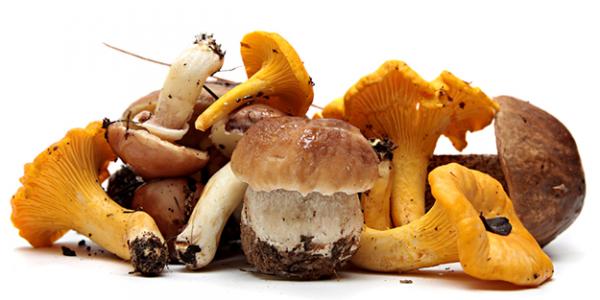
The Magic of Mushrooms
Mushrooms are a bit ‘Marmite’ when it comes to enjoying them as a food. Some gourmets are evangelical about the delights of foraging and cooking funghi – but I must admit until recently, I was not particularly a fan. Admittedly, my culinary experience of mushrooms when I was young were the supermarket white ‘button’ ones. Sadly, these are often cultivated with pesticides, and are now thought to contain natural carcinogens. The jury’s out on how harmful these carcinogens actually are, but I’m avoiding that particular type for now.
These days, I’m more intrigued the by the exotic sounding ‘shrooms – Reishi, Cordyceps and Shiitake – the ones being touted as the latest superfood powders. I was persuaded to try a sachet of Reishi hot chocolate, and this particular powder did make a really satisfyingly rich velvet-smooth cocoa. (Delicious and good for you, tick, tick.) Still, it wasn’t until I met the super interesting and glamorous Spanish Biologist, Catalina Fernandez de Ana Portela that I really began to see what all the fuss was about. Catalina’s father is one of Spain’s most important mycologists (expert in the scientific study of funghi), and she has taken over the family business in an idyllic setting in the ancient chestnut forests of NW Spain, cultivating medicinal mushrooms, producing supplements and continuing to study their benefits.
I began to understand Catalina’s enthusiasm when she explained that scientific evidence shows funghi have lived on earth for 1300 million years, with over 150 compounds allowing them to survive extreme planetary changes. And they’ve been used to improve health for centuries – the ancient ‘Iceman’ discovered in the Alps was carrying a leather pouch, thought to be a kind of ‘medical kit’, filled with strips of funghi perhaps eaten to counteract digestive parasites. Perhaps most famously, Traditional Chinese Medicine (TCM) has used funghi for thousands of years to improve longevity, heart and liver function.
We might not even realise that we have access to mushrooms in modern medicine, as VH’s very own Shabir Daya points out, ‘Many antibiotics are derived from fungal extracts and it is estimated that some 50-60 anti-cancer drugs trace their route back to fungi.’ Yet we are still at the beginning of scientific understanding the real extent of their magic, as a report on the US science data base PubMed [1] points out: The number of mushroom species on the earth is estimated to be 140,000, suggesting that only 10% are known. Assuming that the proportion of useful mushrooms among the undiscovered and unexamined mushrooms will be only 5%, which implies 7,000 yet undiscovered species will be of possible benefit to mankind.
Meantime, we do have lots evidence of the benefits of the big three you’re likely to come across. Here’s a quick summary: Shiitake contain a substance called eritadenine, which encourages body tissues to absorb cholesterol and lower the amount circulating in the blood and is thought to have antiviral and anticancer effects; Cordyceps are used in TCM as an energy boosting tonic, and for improving athletic performance; Reishi has been shown to improve immune function and inhibit the growth of some malignant tumors. It is also anti-inflammatory, reduces allergic responsiveness, and protects the liver.
So, it turns out mushrooms really do live up to their superfood status. ‘They are a great source of protein, B vitamins, fibre and minerals. They also contain polysaccharides called alpha and beta glucans which act to support the immune system,’ says Shabir, who recommends we all benefit by taking a mushroom extract such as Reishi Shiitake Maitake Mushroom Extract by Solgar or a supplement containing mushroom extract like Daily Immunity daily to stay well during the Winter months. Not forgetting that eating the whole food as well as taking a supplement is even better. ‘Whilst supplements contain therapeutic strengths of mushroom extracts, food sources always contain other chemicals which may also be of benefit.’
Find out more
- Catalina Fernandez de Ana Portela’s brand is called Hifas da Terra. The company offer a mycotherapy service where medical experts can offer personal advice on how to use mushrooms to help with health concerns http://www.hifasdaterra.com/web/s/mycotherapy_consult/
- Dr Andrew Weil, expert in integrative medicine is a huge fan of funghi – here he explains why http://www.drweil.com/drw/u/ALB00052/Mushrooms-Are-Amazing.html#_ga=1.96975319.911805116.1360759919
- Paul Stamets study and passion for funghi spans 40 years, and he explains in his TED talk how they can help us beyond our own health http://www.ted.com/talks/paul_stamets_on_6_ways_mushrooms_can_save_the_world?language=en
[1]http://www.ncbi.nlm.nih.gov/pmc/articles/PMC1193547/
DISCLAIMER: The views, opinions and information expressed in this article and on Victoriahealth.com Ltd are those of the author(s) in an editorial context. Victoriahealth.com Ltd cannot be held responsible for any errors or for any consequences arising from the use of the information contained in this editorial or anywhere else on the site. Every effort is made by the editorial and content team to see that no inaccurate or misleading information, opinion or statement appear, nor replace or constitute endorsement from medical bodies or trials unless specified. Victoriahealth.com Ltd accept no liability for the consequences of any inaccurate or misleading data, information, opinion or statement. Information on Victoriahealth.com Ltd and in the editorials is provided for informational purposes only and is not intended as a substitute for the advice provided by your physician or other healthcare professional. You should not use the information on this website or in the editorials for diagnosing or treating a health concern or disease, or for the replacement of prescription medication or other treatment.